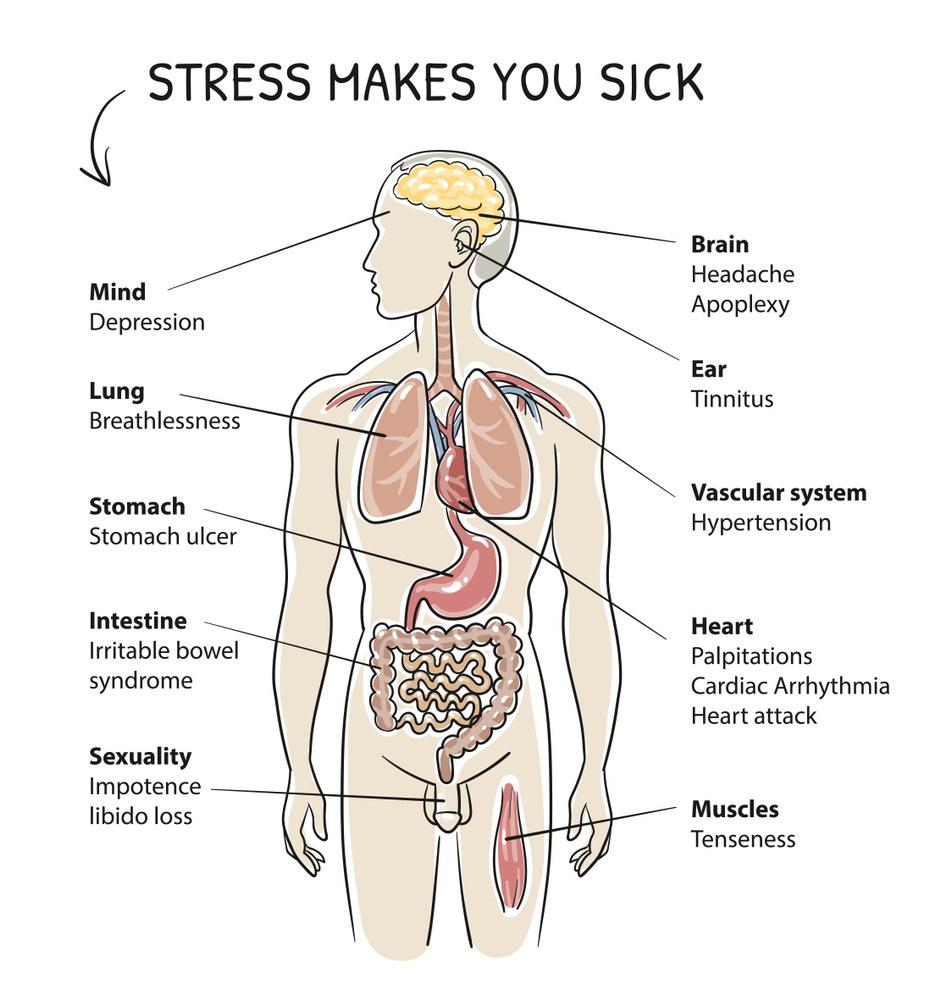23 Ways Through Which Stress Can Affect Your Body.
23 Ways Through Which Stress Can Affect Your Body.

Psychological stress has negative effects on our bodies—whether it’s just an everyday frustration or a life-changing event. Stress affects everyone in a different way—what is stressful for one person may be enjoyable for another. Not all stress is bad—some stress helps improve memory and motivates you. But, stress does account for a majority of doctor’s visits and can make illness worse.
This article covers different ways that stress can impact your body. Don’t be discouraged though because you can control your stress levels with things such as exercising, meditating, among others.
Fight or Flight
Your body has been designed with strategies to protect you from danger. The fight or flight response warns your body and prepares it to take action. When your brain senses you may be in danger, the hypothalamus (part of the brain) sends signals to the adrenals (glands that sit just above your kidneys). Your adrenal glands send hormones (like cortisol) into your body, which creates a physical response—increase blood pressure, elevated blood sugar, etc. If you are being chased by a wild animal, this response comes in handy. However, if you are facing something like a divorce, this long-term response can negatively affect your health.
Food cravings
During stressful times, your body may release unnecessary cortisol, which, according to some studies, can make you have cravings for unhealthy foods. According to some scientists, the receptors in your brain that control how much food you eat are bound by Cortisol, which can cause you to gain weight. Those who are already overweight are even more susceptible to this response. Whenever you sense stress or know you are coming upon a stressful time in your life, be prepared to combat this response—know your triggers.
Storing fat
According to Philip Hagan, an assistant professor of medicine at the Mayo Clinic, “You can clearly correlate stress to weight gain.” This is partly due to eating habits during times of stress. However, the amount of fat tissue your body holds on to will increase with Cortisol. It can also increase the size of your fat cells too. Belly fat has been linked to high levels of cortisol. One of the ways to control this response is to exercise, which is a great way to relieve stress and burn deep abdominal fat.
Heart
Science is unclear about the link between stress and heart attacks, but studies are showing more and more of a reason to be concerned. A study done in Europe examined 200,000 workers and how their job’s stress levels relate to their risk of having a heart attack. The study found that those whose jobs were less stressful were 23% less likely to have a heart attack. The best way to help your heart is to live a healthy lifestyle and eat heart-healthy foods.
Lack of sleep
One of the causes of hyperarousal, which is a biological state in which you don’t feel sleepy, is stress. Acute episodes of stress may only cause short-term sleep loss—it usually gets better after the stressor is gone. However, people who are exposed to long-term stress are at risk of developing chronic sleep problems and disorders. To combat this response, try to improve your sleep routine and environment. Yoga or other stress-relieving activities can also help.
Headaches
Vascular changes caused by the fight or flight response chemicals (adrenaline and cortisol) can leave you with a migraine or tension headache. These headaches can happen during the stressful event or after when you are coming down from the response. During times of stress, your muscles can tense, which will actually make your headache worse. Don’t just treat your headache acutely; try to improve the stress in your life so that you can avoid them altogether.
Memory
Your brain’s ability to form new memories can actually be reduced by the stress hormone cortisol. Not only that, Cortisol can interfere with your neurotransmitters, making it more difficult for your brain cells to communicate with each other. You may have a difficult time thinking straight or retrieving your memories. A great way to combat stress and improve your memory is through meditation.

Hair
Not all researchers agree, but some believe that stress can actually cause hair loss. Alopecia areata, an autoimmune disorder, has been linked, by some scientists, to stress. Trichotillomania, a disease in which people have an uncontrollable urge to pull their hair out, is sometimes caused by stress. Although many people link grey hair to stress, there really is no scientific evidence for that.
Pregnancy
Pregnancy is not usually affected by everyday stressors; however, chronic or severe stress can increase a woman’s chance of preterm labor. There is also research that has found that extreme stress can affect the developing brain of a fetus. Talk to your doctor about things like prenatal yoga or other strategies to relieve stress during pregnancy, especially if you are under a significant amount of stress. Your ability to get pregnant can also be affected by stress. Women with high levels of alpha-amylase, a stress-related substance, were 12% less likely to get pregnant than those with lower concentrations of the substance, according to one study.
High blood sugar
Blood sugar levels increase when people are stress. Those with type 2 diabetes will notice that their blood sugar levels increase when they are under stress. To help keep your blood sugar levels under control, eat foods low in sugar, exercise, or work with your doctor to adjust your medications. According to one study, which studied obese African American women, your risk of getting diabetes may increase as a result of stress.
Digestion
Stress can make stomach ailments, like cramping, diarrhea, and heartburn worse. IBS (irritable bowel syndrome) is believed to be worsened by stress. On the other hand, stomach ulcers are not caused by stress, which is something many people believe. Stomach ulcers are actually caused by a bacteria called H. pylori and can be treated with antibiotics.
Elevated blood pressure
Blood pressure can be increased temporarily by stress because of increased heart rate and blood vessel constriction. However, once the stressor has gone away, blood pressure usually returns to normal. Chronic stress’ effects on blood pressure are not clear, so it is good to practice stress-relieving techniques like meditation and mindfulness. Natural treatments for high blood pressure include healthy eating habits and regular exercise.
Brain tissue
According to research that looks at brain imaging, the amount of tissue in the brain regions responsible for regulating emotions and self-control is reduced by major stressors. This reduction in tissue can make it more difficult to deal with stress later. It can, however, be reversed by using stress management techniques.
Acne
Stress can exacerbate acne—and most people with acne would agree. Students with acne, according to research, are more likely to break out during high-stress times, such as taking exams. Male hormones called androgens seem to be one of the causes, especially in girls. Psoriasis is also worse or can bring on new cases during times of stress. Today, doctors commonly use stress management treatments like meditation and biofeedback to treat psoriasis.
Back pain
Stress can contribute to chronic back pain or be responsible for an acute case of back pain. The fight or flight response is most likely to blame because of the muscle tensing that occurs. People who suffer from anxiety and negative thinking are more likely to experience back pain, according to a European study. Whereas, a U.S. study found that anger and mental distress are linked to chronic back pain.
Sex appeal
Men with higher levels of cortisol are less attractive to women, according to one study. This may be because low levels of stress hormones indicate strength and health, according to researchers.
Stroke
Stress has been linked to an increased risk of stroke, according to a study done on 20,000 people who had never had heart disease or a stroke. Adults who have experienced significant stress in their life were more than four times more likely to have a stroke than those who had not experienced stressful events in the previous year, according to another study. Stress-related hypertension and atherosclerosis (narrowing of the arteries) are likely to blame.
Premature aging
Cell chromosomes have protective caps called telomeres. These caps slow the aging process. Stress and trauma can shorten telomeres, which causes premature aging. If you have a habit of exercising vigorously three times a week, you may be able to counteract this premature aging effect.
Colds
If you have a significant amount of stress in your life, your body may not be able to effectively fight off a cold. Your body has a hormone that turns off inflammation, and researchers think that your immune cells, when you’re under stress, may be less sensitive to these hormones. This may also explain why stress can cause serious diseases.
Asthma
People who have asthma often experience worsening symptoms when they are stressed. Children who are experiencing significant levels of stress have a greater risk of having an asthma attack, according to one study. When compared with children who are not under significant stress, they had twice as much risk of having an attack over the following two weeks. Although we don’t know why, stress may be responsible for an increased immune response to things like pollen, animals, and dust.
Job performance
According to a wide study of professions, productivity and satisfaction are greatly reduced during times of stress, which is also linked to depression. Stress management training can help, addressing company-wide things like poor communication at work and individual stressors as well. Dr. Hagen points out that “stress clearly has an effect on productivity” and can be very costly for employees.
Seizures
Seizures are a rare response to stress, but there are some people, according to Johns Hopkins Hospital researchers, who may be more susceptible to seizure-type reactions, like blank stares and even convulsions. Doctors concluded that the patients who don’t respond to seizure meds (1/3 of them) have had a stress-induced seizure symptom. Some people can express emotional trauma as physical symptoms subconsciously—this is known as conversion disorder.
Sex drive
Most couples can agree with research that their sex lives are affected by high levels of stress. When under a significant amount of stress, couples are not as active when compared with those who are not. Although sexual dysfunction is a serious medical issue and should be discussed with your doctor, many times stress may be the cause. Try to reduce the amount of stress in your life to help improve your sex life.
Here is what you can do!
Explore what Well Managed Mind has to offer. WMM has the techniques and abilities needed to help people dealing with chronic or recurring stress, as well as all other negative feelings. Well Managed Mind techniques are able to trace back to the past experience or scenario, find what is causing the negative emotion, and allows you to learn quick fixes that will help you get back to your day feeling great. Once you’ve learned your WMM techniques, and you become triggered or stressed, you have multiple quick fix tools at your disposal that are catered to you, allowing you to get past the negative emotion quickly, instead of spending large amounts of time using traditional general self-help techniques.
How To Make It Happen
WMM techniques minimize the frequency of negative emotions occuring, and they also arm you with your own way of overcoming them when they do happen. Give yourself peace of mind by gaining these techniques, so that you know you can deal with any emotion that life throws at you. Click Here to explore Well Managed Mind’s solution to stress, and schedule a free consultation, and join our program today!
